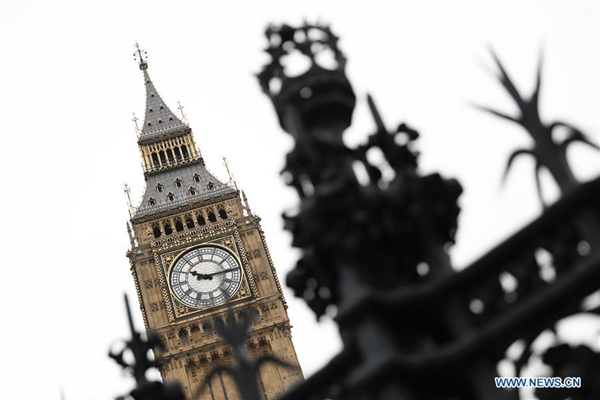The irreversible finally got reversed
- By Sumantra Maitra
 0 Comment(s)
0 Comment(s) Print
Print E-mail China.org.cn, March 31, 2017
E-mail China.org.cn, March 31, 2017
|
|
|
Photo taken on March 14, 2017 shows the "Big Ben" in central London, Britain. The British upper house of the Parliament passed the Brexit Bill Monday night, clearing the last hurdle for the government to trigger Brexit. (Xinhua/Han Yan) |
Nine months after the Brexit vote started a series of unpredictable events across the Western world, the U.K. has finally triggered Articles 50 to start the complicated process of leaving the European Union.
Confirmation of this was contained in a letter from Prime Minister Theresa May handed over by the British ambassador to Brussels to EU President Donald Tusk. This will now set off a chain of events ending Britain's 44-year membership of the single market.
Something that was once considered irreversible has finally been reversed. The EU which was considered an ever-expanding phenomenon has suddenly lost one of the biggest global powers.
The tone of the letter was conciliatory as expected. It contained none of the belligerent campaign mode rhetoric, and threats of a trade war or even worse, a geopolitical conflict. Mrs. May, just like her cabinet and majority of the British parliament, understands how critical it is for Britain to be conciliatory to try and obtain a deal beneficial to both sides.
President Tusk adopted the same tone, stressing the EU would enter the negotiations with an open mind in the interests of many millions across Europe.
The letter highlights some significant details. It states that a law will be introduced to "convert" EU laws back to U.K. ones, which will guarantee "certainty" for British as well as European citizens in Britain. It also highlights that failure to guarantee a deal would mean a lengthy case before the WTO, which would hamper intelligence and security cooperation between the U.K. and the EU -- a nod to the longstanding British contribution and strength in guaranteeing European security. Britain, it is stressed, wants the EU to continue to be strong and prosperous.
The letter also highlights a few fundamental non-negotiable points. The first is the spirit of negotiation will be among equals and no side should try and bully the other into submission. The second point, the most important of all, is the guarantee of the rights of citizens, including Britons working in the EU and those from the latter working in the U.K.
This has been a cause of some concern among policymakers, and now it seems Britain wants to play it nice. The need for minimal disruption for investors, businesses and citizens is obviously vital to protect the wider economy.
So far, so good -- Britain understands the need to keep the interests of both individuals in mind in order to guarantee the employment of millions.
Europeans also understand what might happen if there's a cliff edge situation, including severe problems for millions of Europeans working in U.K., as well as the overall economy of the EU. As long as these concerns are considered, there are chances of smooth negotiations.
The rights of EU citizens to remain in the U.K. are of vital importance. London Mayor Sadiq Khan stated that an appropriate deal on this would guarantee there's no mass London exodus. The EU chief negotiator Michel Barnier also stated that this would be a primary point of negotiation before the end of this year. This is welcome sign.
Finally, of course, there's the issue of geopolitics. EU faces a rising Russia and a crumbling Turkey, alongside autocratic and nationalist tendencies in Eastern Europe and new fears of war in the Balkans. Alongside that, there's an America that is more than happy to just walk away from security guarantee of Europe.
In the south, EU faces constant war, terrorism, people smuggling and a migration crisis. If I was a EU bureaucrat sitting in Brussels, and if I was not too ideological and fixated in my beliefs, I'd be foolish at this stage, to antagonize the British, the second largest spender within Europe after Germany, still the biggest military power and security guarantor on the European continent, and the largest employer and economic sector for Europeans in the single market.
Alliances and unions rise and fall. If history teaches us anything, it is that there is no permanent state of world politics. A period of 20 or 50 years is a long time in which anything can change, for good or bad.
At this stage, it's impossible to predict with any accuracy what might happen. Brexit might be a disaster, or a domino, or good for both U.K. and EU. It seems Europeans understand that, which is a good start.
Sumantra Maitra is a columnist with China.org.cn. For more information please visit:
http://www.china.org.cn/opinion/SumantraMaitra.htm
Opinion articles reflect the views of their authors only, not necessarily those of China.org.cn.







Go to Forum >>0 Comment(s)